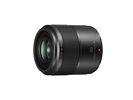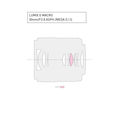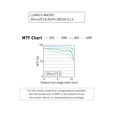Panasonic LUMIX G Macro 30mm F2,8 II ASPH. O.I.S


Beschreibung
Eine klassische mittlere Makrobrennweite von 30 mm (entspricht 60 mm bei Kleinbildkameras).
Es handelt sich um ein "voll korrigiertes" Macroobjektiv, welches über den gesamten Bereich - von Unendlich bis zum Abbildungsmaßstab 1:1 hervorragende Leistungen bietet.
Panasonic-Code: H-HS030
Vom Objektiv sind zwei Varianten bekannt:
Inwieweit sich die Varianten unterscheiden, ist nicht bekannt - bei den Bildbeispielen finden Sie Abbildungen beider Varianten.
Die Panasonic-Alternative zum Olympus M.ZUIKO DIGITAL ED 30mm F3.5 MACRO - etwas lichtstärker (1/2 Blende), geringfügig größer und schwerer, dafür aber mit einem eingebauten Bildstabilisator ausgerüstet. Dies ist insbesondere für Besitzer von älteren Panasonic-mFT-Kameras interessant, wenn diese - entgegen allen Olympus-mFT-Kameras - keinen "Gehäuse-Bildstabilisator" haben.
Zu beachten ist auch, dass das Olympus M.ZUIKO DIGITAL ED 30mm F3.5 MACRO - trotz gleicher Brennweite - eine kürzere Naheinstellgrenze hat, es kann also eine etwas größerer Abbildungsmaßstab (1.25x) erzielt werden.
Bei beiden Objektiven beträgt der minimale Arbeitsabstand (bei Ausnutzung der Naheinstellgrenze) ca. 14-18 mm. Deshalb sind beide z.B. für Aufnahmen von Insekten schlecht geeignet, da hier in der Regel der Fluchtabstand unterschritten wird.
Hier ist eher das Olympus M.ZUIKO DIGITAL ED 60mm F2.8 Macro oder das LEICA DG MACRO-ELMARIT 1:2.8/45 ASPH. zu empfehlen, welche - nicht nur durch die längere Brennweite - bei kleinen Tieren nicht in die Fluchtdistanz "eindringen".
Der geringe Arbeitsabstand bringt auch Probleme bei der Beleuchtung der Motive, externe Lichtquellen (z.B. spezielle Makro-Blitzgeräte) leuchten diese in der Regel auch nicht gleichmäßig aus - dies ist auf jeden Fall bei der Kaufentscheidung zu beachten (hier auch wieder der Hinweis auf die längerbrennweitigen Produkte von Olympus und Panasonic - s.o.).
Weiterhin ist beim Panasonic LUMIX G Macro 30mm F2,8 II ASPH. O.I.S "etwas mehr Metall verbaut" (d.h. Teile der Fassung bestehen aus Metall), während das Olympus M.ZUIKO DIGITAL ED 30mm F3.5 MACRO (bis auf das Bajonett) komplett aus Kunststoff besteht.
Firmware-Updates
Wie auch bei vielen anderen Objektiven liefert Panasonic auch hierzu umfangreiche Firmware-Updates:
| Version | Veröffentlichung am | Beschreibung |
| 1.0 | - | Produkteinführung |
| 1.1 | 05.08.2015 | Dual I.S.( Image Stabilizer ) is available by this firmware update. (in case of the usage of Camera with this function) * Dual I.S.:Innovative Handshake Correction System by the ideal combination of lens I.S and Body I.S. |
| 1.2 | 27.09.2017 | Dual I.S.2 is available by this firmware update. (in case of the usage of Camera with this function) |
| 1.3 | 10.05.2018 | Improved focusing stability when using the Lens Position Resume function. |
Vergleich zwischen dem M.ZUIKO DIGITAL ED 30mm F3.5 MACRO und dem Panasonic LUMIX G Macro 30mm F2,8 II ASPH. O.I.S.
Hierzu eine kleine Tabelle mit den wichtigsten Daten:
| Olympus M.ZUIKO DIGITAL ED 30mm F3.5 MACRO | Panasonic LUMIX G Macro 30mm F2,8 II ASPH. O.I.S. | |
| Optische Konstruktion | 7 Linsen in 6 Gruppen (1 asphärische-, 1 ED- und eine 1 dual asphärische Linse) | 9 Linsen in 9 Gruppen (1 asphärische Linse) |
| Maximale Lichtstärke | F3.5 | F2.8 |
| Kleinstmögliche Blende | F22 | |
| Anzahl der Blendenlamellen | 7, kreisförmig | |
| Bildstabilisator im Objektiv | nein | ja, O.I.S. |
| Nahgrenze | 9.5 cm | 10.5 cm |
| Maximale Vergrößerung | 1.25 x | 1.00 x |
| Filtergewinde | 46 mm | |
| Größe (Durchmesser x Länge) | 57 x 60 mm | 58.5 x 63.5 mm |
| Gewicht | 128 Gramm | 180 Gramm |
| "Straßenpreis" | unter 300€ | |
Zitate
Ein Zitat aus dem Test in photozone.de:
- "The Panasonic Lumix G 30mm f/2.8 ASPH Mega OIS macro delivered a more than solid performance during our tests. The lens is extremely sharp especially at f/2.8 and f/4. Low lateral CAs contributed to the very high sharpness perception. Unlike some other MFT lenses, it is a fully corrected lens thus distortions are marginal. The vignetting relies on auto-correction at large apertures so you have to live with increased sensor noise in the image corners at f/2.8. The original (RAW-)vignetting is reasonable though. The bokeh is generally very smooth although out-of-focus highlights aren't perfectly rendered."
"The build quality of this little Panasonic lens is quite impressive. It may not feel like much but the metal body is reassuring (although that's somewhat subjective). The constant physical length as well as the smooth focus ring are also appreciated. Weather sealing is not provided though. The AF is noiseless and it's also fast unless it has to hunt throughout the focus range. We miss a focus limiter but given the low price tag, we probably can't have it all."
"Technically there's nothing to complain about the Panasonic lens. It's sharp, small and affordable. However, if macro photography is really your thing, it probably makes more sense to check out the Olympus M.Zuiko 60mm f/2.8 ED macro. The Olympus lens isn't superior but it can provide a longer working distance to your main subject. Even if you are not hunting bugs, it makes life a lot easier as far as scene lighting is concerned."
Ein Zitat aus dem Praxistest in d-pixx.de:
- "Das Panasonic Lumix 2,8/30 mm Asph. Mega OIS G Macro überzeugt mit seiner Abbildungsleistung auf der ganzen Linie. Und weil es klein und leicht ist, ist es kein Problem, praktisch immer und überall auf diese Leistung zurückzugreifen – und zwar nicht nur im Nah- und Makrobereich. Wenn man auf eine höhere Lichtstärke verzichten kann, ist das Objektiv nämlich auch ein hervorragender Allrounder, den man ruhig anstelle eines Standardzooms als „Immerdrauf“ einsetzen kann."
"Testergebnis: HERVORRAGEND PLUS"
Ein Zitat aus dem Test in digitalkamera.de:
- "Für nur 350 Euro bekommt man mit dem Panasonic Lumix G Macro 30 mm 2.8 Asph OIS ein ausgesprochen gutes Makro- wie Universalobjektiv. Es besitzt nicht nur eine hochwertige Verarbeitung, sondern ist auch mit einem optischen Bildstabilisator ausgestattet. Ein schützender Objektivbeutel gehört sogar zum Lieferumfang und das Objektiv ist "Made in Japan". Nur eine Sonnenblende gibt es leider nicht. Zum Glück ist das Makro aber auch recht gegenlichtresistent. Bei der Bildqualität überzeugt es mit der Abwesenheit von Verzeichnung und einer ausgesprochen guten Auflösung schon bei Offenblende. Vor allem im Bereich von F2,8 bis F5,6 liefert es sehr gute Bildergebnisse mit nur einem leichten Auflösungsabfall zum Bildrand."
Ein Zitat aus dem Review bei photographyblog.com:
- "The Panasonic LUMIX G MACRO 30mm f/2.8 ASPH. MEGA O.I.S. is an excellent macro lens, offering true 1:1 magnification in a small and light yet solidly-built package. Some people will find the 60mm effective focal length a little limiting, and the lack of weather-sealing is disappointing, but in all other regards this lens is an outstanding performer."
"Build quality is very good considering the affordable price tag and the light weight, with the mostly metal construction inspiring confidence. Given that it's a macro lens which covers a very wide focal distance, it's fast to focus on the DMC-GX7 camera and almost virtually silent too, making it well-suited to both stills and video. It also doubles up as an effective short telephoto lens thanks to that speedy AF system. This lens is small and lightweight, making it an excellent partner for a camera like the DMC-GX7."
"Optically the Panasonic LUMIX G MACRO 30mm f/2.8 ASPH. MEGA O.I.S. is an outstanding performer. You can safely use it wide open at f/2.8 for optimum results, with even the edges of the frame looking sharp. Chromatic aberrations are almost completely absent, while distortions are automatically corrected on both Olympus and Panasonic bodies, and vignetting is only really an issue at f/2.8. The inclusion of built-in image stabilisation is the icing on the cake, though it's a shame that there's no dedicated switch to turn it on and off."
"The Panasonic LUMIX G MACRO 30mm f/2.8 ASPH. MEGA O.I.S. delivers excellent results and performance at a very pleasing price-point, making it an excellent investment for Micro Four Thirds shooters looking for a true 1:1 macro lens."
Ein Zitat aus "14 MFT-Objektive getestet" in markuswaeger.com:
- "Die Schärfeleistung ist exzellent und bereits ab Offenblende voll nutzbar. Dabei ist die Linse wirklich preiswert. Ein absoluter Preis-Leistungs-Hit!"
Ein Zitat aus "Panasonic Lumix GX80 mit Lumix 30 mm Macro - Kompakttest" in d-pixx.de:
- "Aus der Nähe oder aus der Ferne – das kleine Objektiv mit dem langen Namen bringt schon bei Blende 2.8 eine hervorragende Abbildungsleistung in der Bildmitte, mit nur geringem Leistungsabfall zu den Rändern und Ecken. Hervorragende und sehr gleichmäßige Abbildungsleistung über das Bildfeld gibt es bei Blende 4 und 5.6 und Blende 8 und 11 sind nur minimal schwächer. Verzeichnung, Vignettierung und chromatische Aberration spielen praktisch keine Rolle."
Technische Daten
| Hersteller: | Panasonic | Bezeichnung: | Panasonic Lumix G Macro 30mm F2,8 II ASPH. O.I.S | |||||||||
|---|---|---|---|---|---|---|---|---|---|---|---|---|
| Brennweite: | 30 mm | Herstellungszeitraum: | 2014 - - | |||||||||
| Lichtstärke: | 2,8 | Blendenbereich: | 2,8-22 | |||||||||
| Baulänge: | 63.5 mm | Durchmesser: | 58.8 mm | |||||||||
| Gewicht: | 180 g | Filtergewinde: | 46 mm | |||||||||
| Min. Entfernung: | 0.15 m | Max. Abbildungsm.: | 1x (Micro FT) / 2x (35-mm-Format) | |||||||||
| Bajonett: | Micro FT | Spritz-/Staubschutz: | nein | Bildstabilisator: | ja | |||||||
| Bildwinkel: | 40° | Linsen/Baugruppen: | 9/9 | Blendenaufbau: | 7 kreisförmige Lamellen | |||||||
| Innenfokussierung: | ja | Geradführung: | ja | Innenzoom: | entfällt | |||||||
| AF-Antrieb: | Schrittmotor | Fokussierung: | by Wire | Zoom: | entfällt | |||||||
| Besonderheiten: | 'volle Kontrast-AF-Funktionsunterstützung | |||||||||||
Lieferumfang
- Panasonic LUMIX G Macro 30mm F2,8 II ASPH. O.I.S
- Micro Four Thirds Objektivdeckel
- hintere Objektivkappe für Micro Four Thirds Objektive
- Tragebeutel
- Garantieunterlagen und Bedienungsanleitung
Galerie

Panasonic LUMIX G Macro 30mm F2,8 ASPH. O.I.S - mit freundlicher Genehmigung von arsenal-photo.com
Panasonic LUMIX G Macro 30mm F2,8 ASPH. O.I.S - mit freundlicher Genehmigung von arsenal-photo.com
Panasonic LUMIX G Macro 30mm F2,8 ASPH. O.I.S - mit freundlicher Genehmigung von arsenal-photo.com
Panasonic LUMIX G Macro 30mm F2,8 ASPH. O.I.S - mit freundlicher Genehmigung von arsenal-photo.com
Panasonic LUMIX G Macro 30mm F2,8 ASPH. O.I.S - mit freundlicher Genehmigung von arsenal-photo.com
Panasonic LUMIX G Macro 30mm F2,8 ASPH. O.I.S - mit freundlicher Genehmigung von arsenal-photo.com
Panasonic LUMIX G Macro 30mm F2,8 II ASPH. O.I.S - mit freundlicher Genehmigung von Foto Brell, Frankfurt
Panasonic LUMIX G Macro 30mm F2,8 II ASPH. O.I.S - mit freundlicher Genehmigung von Foto Brell, Frankfurt
Panasonic LUMIX G Macro 30mm F2,8 II ASPH. O.I.S - mit freundlicher Genehmigung von panasonic.de
Panasonic LUMIX G Macro 30mm F2,8 II ASPH. O.I.S - mit freundlicher Genehmigung von panasonic.de
Panasonic LUMIX G Macro 30mm F2,8 II ASPH. O.I.S - mit freundlicher Genehmigung von panasonic.de
Panasonic LUMIX G Macro 30mm F2,8 II ASPH. O.I.S - mit freundlicher Genehmigung von panasonic.de
Linsenschnitt des Panasonic LUMIX G Macro 30mm F2,8 II ASPH. O.I.S - mit freundlicher Genehmigung von panasonic.de
MTF-Kurven zum Panasonic LUMIX G Macro 30mm F2,8 II ASPH. O.I.S - mit freundlicher Genehmigung von panasonic.de
Tests und Bewertungen
Objektiv-Bewertung von DXOmark
Zur Einschätzung des Objektivs einige vergleichende Wertungen von DXOmark (jeweils an einer Olympus E-M1 OM-D):
| Objektiv | DxOMark Score | Sharpness | Transmission | Distortion | Vignetting | Chr. aberration |
| LEICA DG SUMMILUX 1:1,4/25 ASPH. | 24 | 11 MP | F1.7 | 1.6% | -1.2EV | 14µm |
| Olympus M.ZUIKO DIGITAL 25mm F1.2 PRO | 23 | 10 MP | F1,6 | 0.2% | -1.2EV | 15µm |
| Olympus M.ZUIKO DIGITAL 25mm F1.8 | ? | ? MP | F?.? | ?.?% | -?.?EV | ?µm |
| Olympus M.ZUIKO DIGITAL ED 30mm F3.5 MACRO | ? | ? MP | F?.? | ?.?% | -?.?EV | ?µm |
| Panasonic LUMIX G 25mm F1.7 ASPH. | 20 | 7 MP | F2.0 | 1.2% | -1.4EV | 19µm |
| Panasonic LUMIX G Macro 30mm F2,8 II ASPH. O.I.S | 19 | 9 MP | F3.1 | 0.4% | -1.2EV | 6µm |
| Sigma 30mm F1.4 DC DN Contemporary | 24 | 10 MP | F1.7 | 0.8% | -0.9EV | 5µm |
| Sigma 30mm F2.8 EX DN | 17 | 8 MP | F3.1 | 0.2% | -0.8EV | 22µm |
| Sigma 30mm F2,8 DN [A] | 18 | 8 MP | F3.1 | 0.3% | -0.7EV | 21µm |
Wertungen bei ephotozine.com
Das Panasonic LUMIX G Macro 30mm F2,8 II ASPH. O.I.S wurde in der 2018-er Bestenliste von ephotozine.com geführt: No. 6.















